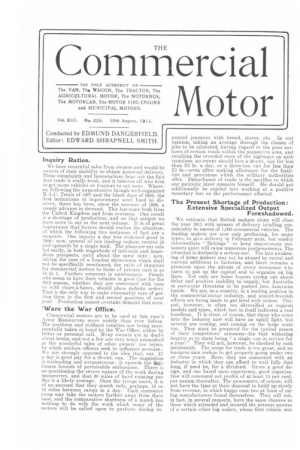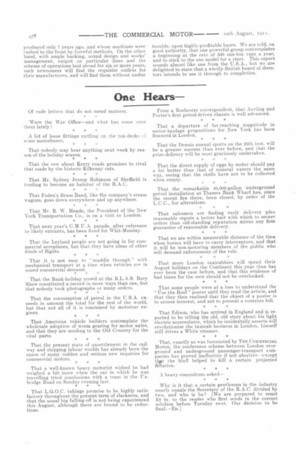Inquiry Ratios.
Page 1

Page 2

If you've noticed an error in this article please click here to report it so we can fix it.
We hear mournful tales from owners and would-be owncrs of their inability to obtain punctual delivery. These complaints and lamentations bear out the fact that trade is really brisk, and it behoves all who wish to get more vehicles or tractors to act soon. Whereas, following the unproductive though well-organized R.A.C. Trials of l907 and the black days of 1908, the first indications of improvement were bard to discover, there has been, since the summer of 1909, a steady advance in demand. This has conic both from the United Kingdom and from overseas. One result is a shortage of production, and on that subject we have more to say in the next column. II is of great importance that buyers should realize the situation, of which the following two instances of fact are a measure. One inquiry a day was reckoned good in 1909: now, several of our leading makers receive 20 and upwards by a single mail. The pleasure-car side led easily, in both magnitude of interests and immediate prospects, until about the same date : now, taking the case of a London showrooms which shall not be specifically mentioned, the ratio of inquiries for commercial motors to those of private cars is as IS to 1. Further comment is unnecessary. People who mean to have their vehicles in good time for the 1912 season, whether they are concerned with vans or with chars-h-bancs, should place definite orders. That is the only way to make reasonably sure of getting them in the first and second quarters of next year. Production cannot overtake demand that. soon.
'Ware the War Office.
Commercial motors are to be used at this year's Army Manoeuvres more widely than ever before. The southern and midland counties are being mostcarefully taken in hand by the War Office, either by letter or personal call. Maw owners are in doubt about terms, and not a few are very much astonished at the wonderful tales of other owners' low terms, hy which zealous officers seek to influence promise,. We are strongly opposed to the idea that, say, Li a day is good pay for a 30-cwt. van. The suggestion is misleading and preposterous : it exceeds the legitimate bounds of permissible enthusiasm. There is no questioning the severe nature of the work during mameuvres, and that 60 miles of hard running per day is a likely average. Once the troops move, it is of no account that they march only, perhaps, 10 or 12 miles between camps in a day. Each successive camp may take the motors farther away from their base, and the comparative shortness of a march has nothing to do with the work which many of the motors will be called upon to perform during re peated journeys with bread, stores, etc. In our opinion, taking an average through the classes of jobs to be allocated, having regard to the poor surfaces of certain roads within the manteuvre area, and recalling the crowded state of the highways on such occasions; no owner should hire a 30-cwt. van for less than .f.:2 2s. a day, or a three-ton van for less than £3 3s.—even after making allowance for the facilities and provisions which the military authorities offer. Disturbance of trade is the sacrifice to which any patriotic hirer commits himself. He should not additionally be cajoled into working at a positive monetary loss on the performance effected.
The Present Shorta4e of Production: Extensive Specialized Output Foreshadowed.
We estimate that British makers alone will close the year 1911 with arrears of delivery totalling considerably in excess of 1,000 commercial vehicles. The leading makers are now only professing, for many types, to give delivery in February next, but sundry intermediate " filchings " to keep importunate customers quiet will cause numerous postponements. The situation is distinctly a serious One. The late awakening of home makers may not he atoned by recent and current additions to factories, and there remains a premium upon the advent of every newcomer who cares to put up the capital and to organize on big lines. Not only are home buyers crying out about delay and positive inability to supply, but Australia in particular threatens to be pushed into American hands. We are, as a country, in a leading position in the commercial-motor industry, and almost-feverish efforts are being made to get level with orders. Output, however, is often too diversified as regards models and types, which fact in itself indicates a real handicap. It is clear, of course, that those who come into the industry now will have an uphill fight, but several are coming, and coming on the large scale too. They must be prepared for the cynical sneers of their competitors' salesmen—for that withering inquiry as to there being " a single van in service for a year." They will not, however, be checked by such incidentals. The scope for trade is too great, and no business men reckon to get properly going under two or three years. Here, they are concerned with an industry in which they can afford to wait fully that long, if need be, for a dividend. Given a good design, and one based upon experience, good organization will command net profits of at least 15 per cent. per annum thereafter. The newcomers, of course, will not have the time at their disposal to build up slowly from revenue, in which happy case two at least of our big manufacturers found themselves. They will not, in fact, in several respects, have the same chances as those which attended and secured the present success of a certain other big maker, whose first vehicle was
produced only 7 years ago, and whose machines were rushed to the front by forceful methods. On the other hand, with ample backing, sound design and works' management, output on particular lines and the scheme of operations laid ahead for six or more years, such newcomers will find the requisite outlets for their manufactures, and will find them without undue trouble, upon highly-profitable bases. We are told, on good authority, that one powerful group contemplates a beginning at the rate of 500 one-ton vans a year, and to stick to the one model for a start. This report sounds almost like one from the U.S.A., but we are delighted to state that a wholly-British board of threetors intends to see it through to completion.


















